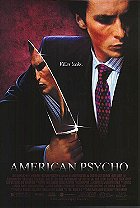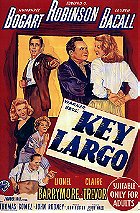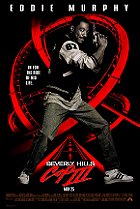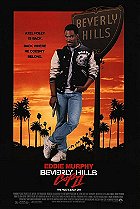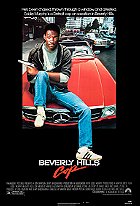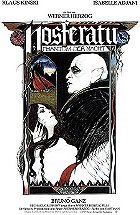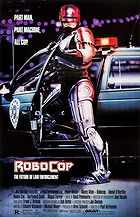An ultraviolent science fiction action masterpiece, 1987's RoboCop is an intelligent, exciting, darkly humorous genre flick that subversively poses as a schlocky B-movie. At first glance, RoboCop might look like a simplistic Terminator-inspired sci-fi thriller with no cultural staying power, but the resultant film is an intelligent satire and a badass exploitation action movie, delivering astute social commentary and philosophical messages while engaging viewers with terrific special effects, visceral action set pieces, an intriguing story, and colourful dialogue. Writers Edward Neumeier and Michael Miner (making their screenwriting debut here) took inspiration from multiple sources in constructing the screenplay for RoboCop, with 1982's Blade Runner inspiring the initial concept, but the dark sense of humour and corporate satire makes it feel unique in tone and execution, giving the film a distinct identity. RoboCop remains an iconic classic and a seminal sci-fi picture, capably standing alongside Blade Runner, The Terminator, Alien, 2001: A Space Odyssey, and Metropolis.
In a dystopic near future, crime-ridden Detroit is close to social and financial collapse, and, in desperation, city officials have given control of the Detroit Police Department to the mega-corporation Omni Consumer Products (OCP). With police officers threatening to strike, OCP senior president Dick Jones (Ronny Cox) sees an opportunity to develop an 'urban pacification' robot called ED-209, hoping to usher in a new generation of robotic law enforcement to clean up the community. After ED-209 malfunctions during a demonstration, OCP's chairman (Dan O'Herlihy) gives the go-ahead for ambitious junior executive Bob Morton (Miguel Ferrier) to begin work developing a prototype for his RoboCop program. All they need is a "volunteer" for their RoboCop prototype. When ruthless criminal Clarence Boddicker (Kurtwood Smith) and his gang brutally murder policeman Alex Murphy (Peter Weller) in the line of duty, Morton's team at OCP secretly convert the cop's corpse into a cyborg law enforcement officer with no memory of his identity or former life. RoboCop is a huge success, efficiently cleaning Detroit's streets and attracting media attention. However, Murphy's former duty partner, Officer Anne Lewis (Nancy Allen), suspects that RoboCop is Murphy, and the cyborg begins to recollect fragments of his past life. As RoboCop investigates his own murder, he discovers a connection between Boddicker and Dick Jones.
Themes relating to personal identity and the nature of humanity permeate Murphy's story, as he is part man and part machine. Although Murphy tries to exercise his free will, his programming forbids him from acting on all his impulses, and the flashbacks to his former life evoke the deliberately open-ended question: how much of Murphy remains in RoboCop? Is RoboCop a machine with fragments of Murphy's memories and personality, or is he a resurrected Murphy with mechanical parts? Analysis of the film continues into the 21st Century, with debates about whether or not Murphy is genuinely dead and if RoboCop can regain enough humanity to have a normal life and rejoin his family. The script also introduces a dilemma because RoboCop enforces the law but was built by a corrupt private corporation that does not have Detroit's best interests at heart and wants to hinder their creation from doing its job. Additionally, Murphy's death is a deliberate religious parallel, as the police officer is a Christ-like figure who suffers a gruesome death but is resurrected as RoboCop, a saviour to the people. Director Paul Verhoeven strikes a delicate balance, introducing themes and heady philosophical questions without neglecting the blood and guts, and the violence does not undercut the movie's underlying content.

In addition to the movie's philosophical themes, a wicked sense of humour permeates RoboCop, most notably in the "Media Break" news broadcasts and the mock advertisements that punctuate the story. These segments deliver essential information about the state of this world, with the upbeat television anchors (played by Mario Machado and Leeza Gibbons) discussing world events while the commercials advertise artificial heart transplants (consumers can pick the model heart they prefer) and a futuristic board game called "Nukem" that brilliantly parodies "Battleship." Another iconic moment involves characters watching a fictional sitcom that features a short guy with a moustache surrounded by attractive, tall, busty women. His catchphrase, "I'd buy that for a dollar!" is another oft-remembered quote, with the character parodying popular sitcom characters like Al Bundy.
RoboCop contains plenty of colourful and humorous dialogue, with Boddicker, in particular, delivering a few zingers ("Can you fly, Bobby?" he asks before tossing a henchman onto a police car in pursuit of them). RoboCop also satirises the '80s business culture, sharply critiquing corporate manoeuvring, greed, and corruption, including prioritising profits over individual rights. After all, OCP claims private ownership of RoboCop despite the corporation using a corpse that does not belong to them. Additionally, Neumeier and Miner's script skewers Reagan-era pro-business policies that led to the privatisation of public services (including prisons, hospitals and police) and gentrification of American cities. Suffice it to say, there is much to analyse about RoboCop's satirical content and social commentary.
RoboCop was Verhoeven's American filmmaking debut after helming several Dutch films and 1985's Flesh and Blood, and the director demonstrates his proclivity for excessive violence and tongue-in-cheek humour, which perfectly suits the material. Although Verhoeven initially rejected the offer to direct RoboCop, his wife convinced him to take another look at the script, and the director came around to the idea of executing a pulp premise in a visionary style, in the process introducing himself to a wider audience without forgoing his proclivity for violence, nudity and profanity. The squib-happy Verhoeven goes nuts with the violence, relishing in the use of excessive blood squibs whenever a hapless person is shot. Verhoeven sets the tone early in the proceedings with ED-209 ruthlessly gunning down a young OCP executive (the unrated cut restores even more bloodshed here) just ten minutes into the film, while Murphy's sadistic murder follows soon afterwards. Even by 21st-century standards, RoboCop's violence is graphic, which led the MPAA to burden the picture with a dreaded X-rating. However, Verhoeven and the distributor, Orion Pictures, reasoned that the over-the-top violence is more comical than disturbing. Indeed, the film's violence is often hilarious, including one notable moment during which a mutated villain disintegrates and splatters all over Boddicker's car. Attempts to significantly dilute the violence would only reduce the humour and instead make the violence feel horrific. After nearly a dozen submissions (and a few minor edits), the MPAA eventually awarded the film the desired R-rating.
In contrast to the sanitised PG-13 remake, RoboCop depicts Detroit as a violent hellhole where crime is rampant and dangers abound, while the city itself looks run down aside from the more high-tech OCP building. Although RoboCop's action scenes are schlocky due to the excessive bloodshed, the picture is state-of-the-art from a technical standpoint. Verhoeven admitted to studying James Cameron's The Terminator in preparation for RoboCop, making note of camera placements and the brisk editing pace to create something more effective than a run-of-the-mill action flick. The special effects are astonishingly effective, with Rob Bottin's iconic, elaborate RoboCop armour still looking convincing (that gun is also very cool), while the cinematography (courtesy of Verhoeven's frequent collaborator, Jost Vacano) enhances the character's intimidating presence. Although the stop-motion ED-209 lacks the smooth motion of a modern, digitally-created robot, the puppet has a tangible presence that CGI struggles to emulate, and ED-209 seems to exist alongside the live-action performers believably. Not every special effects shot is perfect (Dick Jones falling off the OCP building at the end looks ropey), but this is part of the picture's enduring charm.
Peter Weller convincingly brings the character of RoboCop to life with his robotic movements and deadpan expressions. Weller spent months working with a professional mime to learn how to move in a distinctive, cyborg-like way, though he could not rehearse in the suit because Bottin's team did not complete it until after filming started. Unfortunately, since the armour was more cumbersome than anticipated, Weller had to quickly adapt by developing a different movement style...after falling out with Verhoeven and being briefly fired. Despite the troubles, Weller is a terrific RoboCop, and it is difficult to imagine anybody else in the role. (This sentiment remains all the more relevant after Weller was recast in 1993's RoboCop 3.) Another of RoboCop's biggest assets is the disarming Nancy Allen as Murphy's partner, Anne Lewis, who adds heart and tenderness to the production. '80s action films of this ilk need strong villains, and Kurtwood Smith (Rambo III, That '70s Show) delivers a memorable performance as the unhinged Clarence Boddicker, gleefully chewing the scenery with his amusing dialogue and maniacal demeanour. Verhoeven encouraged improvisation, leading Smith to perform one memorable, unscripted moment when Boddicker spits blood on the desk of the police station counter.
RoboCop succeeds as a rip-roaring comic book action film and a shrewd science fiction satire, delivering entertaining spectacle and memorable set pieces while gleefully lampooning Reagan-era American culture. Another of the film's successes is its ability to make audiences care about and feel for the titular cyborg, who shows his vulnerable side during surprisingly gentle and emotional scenes that ensure the movie does not come across as another throwaway Terminator knock-off. Plus, for those uninterested in the film's philosophical or thematical underpinnings, viewers can still enjoy and devour RoboCop as a badass sci-fi action extravaganza. It is a quintessential feather in Verhoeven's filmmaking cap, with the director subsequently helming more instant classics like Total Recall and Starship Troopers that deliver the same brand of satire and dark humour mixed with visceral thrills.
10/10
 Login
Login
 Home
Home 183 Lists
183 Lists 1665 Reviews
1665 Reviews Collections
Collections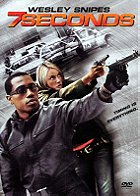
 0 comments,
0 comments, 